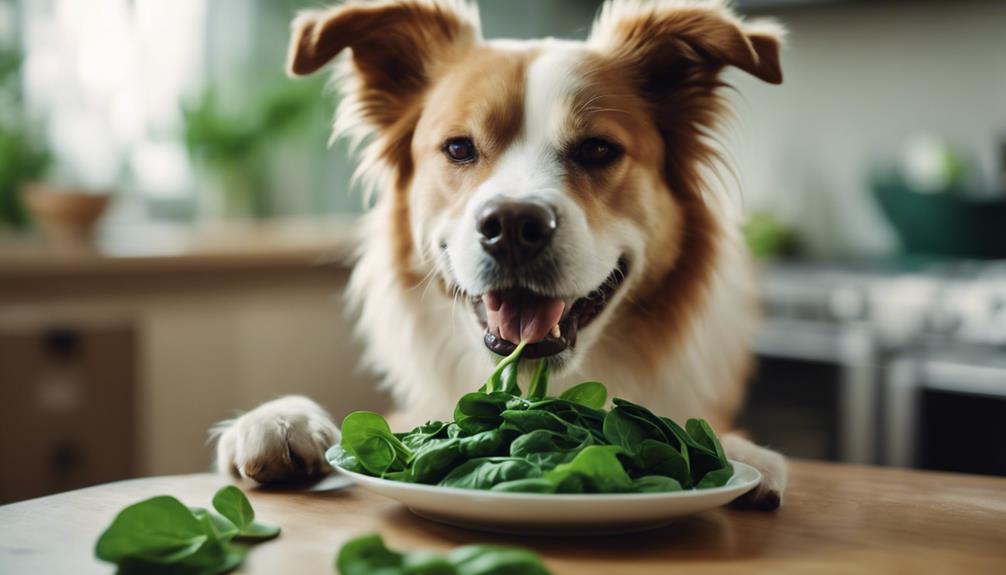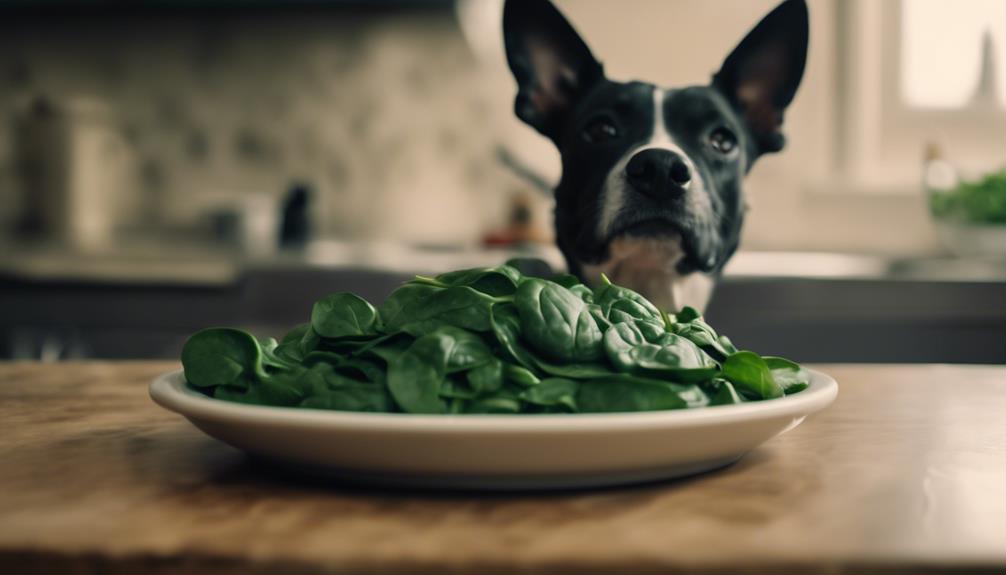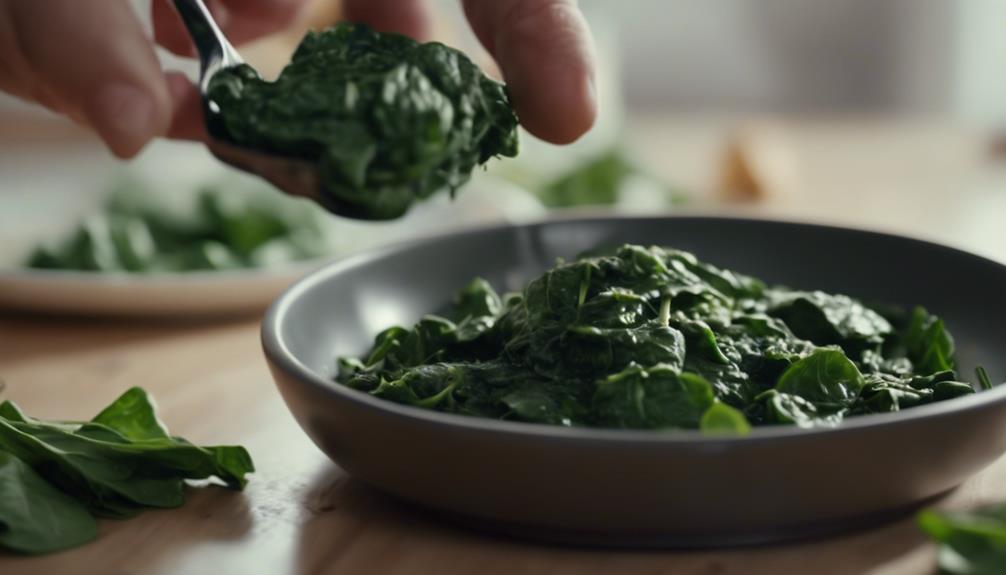While dogs are known to enjoy a variety of human foods, the safety and implications of feeding them spinach remain a topic of interest for many pet owners. With spinach's nutrient-rich profile and potential health benefits, the question of whether it is suitable for canine consumption requires careful consideration.
Factors such as oxalates and sodium levels in spinach, along with the effects of different preparation methods, all play a role in determining if this leafy green is a suitable addition to a dog's diet. Understanding the nuances of incorporating spinach into your dog's meals can help ensure their well-being and optimal nutrition.
Key Takeaways
- Healthy adult dogs can benefit from occasional spinach consumption.
- Puppies should avoid spinach due to underdeveloped kidneys.
- Oxalates in spinach may lead to bladder issues.
- Consult a vet before adding spinach to a dog's diet for optimal health.
Safety Concerns for Dogs Eating Spinach
When considering the safety of dogs consuming spinach, it is important to be mindful of potential health risks associated with this leafy green vegetable. While healthy adult dogs can benefit from the occasional consumption of spinach, caution is advised. Puppies, due to their underdeveloped kidneys, should avoid spinach altogether.
Spinach contains oxalates that may lead to bladder issues, and its high sodium content could pose problems for dogs with certain health conditions. Moreover, excessive intake of spinach can disrupt a dog's balanced diet.
Therefore, it is crucial for dog owners to monitor the quantity of spinach their pets consume and consult with a veterinarian to ensure their furry companions' well-being.
Nutritional Benefits of Spinach for Dogs
Considering the safety concerns surrounding dogs consuming spinach, it is imperative to understand the nutritional benefits this leafy green vegetable can offer to our canine companions. Spinach is a nutrient-dense food that can provide various essential vitamins and minerals beneficial to dogs. Here is a breakdown of the nutritional benefits of spinach for dogs:
| Nutrient | Function |
|---|---|
| Fibers | Aid in digestion and promote gut health |
| Vitamin K | Crucial for blood clotting processes |
| Iron | Essential for hemoglobin production |
Incorporating spinach into your dog's diet in moderation can contribute to their overall health and well-being. Monitoring their response to this leafy green vegetable is recommended to ensure it suits their digestive system.
Importance of Fiber in Spinach

Spinach's fiber content plays a vital role in promoting digestive health and overall well-being in dogs. Including spinach in your dog's diet can provide various benefits:
- Improves Digestion: Fiber in spinach aids in regulating bowel movements and maintaining a healthy digestive system.
- Supports Weight Management: The fiber content in spinach can help your dog feel full longer, potentially assisting in weight management.
- Prevents Constipation: Adequate fiber intake from spinach can prevent constipation and promote regularity in bowel movements.
- Enhances Nutrient Absorption: Fiber helps in absorbing essential nutrients from food, ensuring optimal nutrient uptake for your dog's health.
Vitamin K in Spinach for Dogs
The nutritional value of spinach extends beyond its fiber content, as it also serves as a significant source of vitamin K, which plays a crucial role in various bodily functions for dogs.
Vitamin K is essential for blood clotting, helping in the healing process and preventing excessive bleeding from injuries. Additionally, vitamin K supports bone health in dogs by aiding in proper calcium utilization.
Incorporating spinach, a vitamin K-rich leafy green, into your dog's diet can contribute to their overall well-being. However, it is important to moderate their intake, as excessive vitamin K consumption can lead to adverse effects.
Monitoring the amount of spinach given to your dog ensures they receive the benefits without any potential drawbacks.
Iron Benefits in Spinach

Iron, an essential mineral found in spinach, plays a vital role in supporting hemoglobin production in dogs. This mineral is crucial for maintaining healthy red blood cells and overall circulation in your canine companion.
Here are some key benefits of iron in spinach:
- Supports hemoglobin production
- Aids in oxygen transport in the blood
- Helps prevent anemia
- Contributes to overall energy levels
Ensuring your dog has sufficient iron intake from sources like spinach can help promote their well-being and vitality. However, moderation is key, as excessive iron intake can also have negative effects on your dog's health.
Monitoring Dog's Response to Spinach
After ensuring that your dog receives the necessary iron benefits from spinach, it is essential to monitor their response to this leafy green vegetable to maintain their overall health and well-being.
Introduce spinach gradually into your dog's diet, observing for any signs of gastrointestinal upset such as vomiting, diarrhea, or changes in appetite. Watch for any allergic reactions like itching, swelling, or breathing difficulties.
Additionally, keep an eye on your dog's urine frequency and volume, as oxalates in spinach can potentially lead to bladder issues.
Cooked Vs. Raw Spinach for Dogs

Optimizing the nutritional benefits and digestibility of spinach for dogs involves considering the differences between cooked and raw preparations. When it comes to feeding your furry friend spinach, here are some key points to keep in mind:
- Cooked Spinach:
- Removes harmful oxalates.
- Enhances the digestibility of nutrients.
- Raw Spinach:
- Retains more vitamins and minerals in their natural state.
- May be harder for some dogs to digest efficiently.
Benefits of Cooking Spinach
Enhancing the safety and nutritional value of spinach for dogs can be achieved through the process of cooking, which offers several benefits. Cooking spinach helps break down oxalates, making it safer for dogs to consume. Moreover, the cooking process enhances the digestibility of essential nutrients present in spinach, such as vitamin K and iron, ensuring better absorption by your furry friend's body. When preparing cooked spinach for dogs, it is crucial to avoid adding any harmful ingredients like salt, garlic, or onion. Below is a table summarizing the benefits of cooking spinach for dogs:
| Benefits of Cooking Spinach for Dogs | |
|---|---|
| Breaks down oxalates | Enhances nutrient digestibility |
| Makes spinach safer for dogs | Improves nutrient absorption |
Safe Preparation of Spinach for Dogs

To ensure the safety and well-being of your canine companion, it is essential to prepare spinach in a manner that minimizes potential risks and maximizes its nutritional benefits. When preparing spinach for dogs, consider the following:
- Thoroughly Wash: Rinse the spinach leaves well to remove any pesticides or dirt residue.
- Steam or Boil: Cooking spinach is preferable to serving it raw, as it helps break down oxalates.
- Avoid Seasonings: Do not add salt, garlic, or onion, as these can be harmful to dogs.
- Serve Plain: Offer plain, steamed spinach in moderation to prevent digestive issues and ensure optimal nutrient absorption.
Related Foods for Dogs to Consider
When considering options beyond spinach, it is important to be mindful of the suitability and moderation of related foods for dogs. Corn can be a safe addition to a dog's diet if fed in moderation, providing some nutrients and fiber.
Pineapple is another fruit that can be given to dogs, but it should also be offered sparingly due to its high sugar content. Cabbage is a vegetable that can be included in a dog's diet in limited amounts, as it offers vitamins and antioxidants.
However, caution should be exercised with Thanksgiving foods, as some traditional dishes may contain ingredients that are harmful to dogs. Consulting a veterinary nutritionist before introducing kale, and feeding olives in moderation, are also recommended practices for expanding a dog's dietary options.
Caution With Thanksgiving Foods

Considering the potential risks associated with certain ingredients commonly found in Thanksgiving meals, it is imperative for dog owners to exercise caution when offering these foods to their canine companions. Some Thanksgiving foods may be harmful to dogs due to their ingredients or cooking methods. Here are some key points to keep in mind:
- Turkey bones can splinter and cause internal injuries.
- Stuffing often contains onions and garlic, which are toxic to dogs.
- Gravy is often high in fat and salt, which can lead to pancreatitis.
- Desserts like pies may contain xylitol, chocolate, or raisins, all of which are toxic to dogs.
Being mindful of these hazards can help ensure a safe and enjoyable holiday season for your furry friend.
Additional Safe Foods for Dogs
Exploring the nutritional options beyond spinach that are safe for dogs reveals a variety of additional foods that can be incorporated into their diet with caution and moderation.
While spinach offers certain benefits, other safe options include cooked eggs, lean meats like chicken or turkey (without seasoning), plain cooked sweet potatoes, and small amounts of plain yogurt. Carrots and green beans are also popular choices among dog owners, providing vitamins and fiber.
Blueberries and apples, minus the seeds and core, can serve as nutritious treats. It's important to introduce new foods gradually and monitor your dog for any adverse reactions.
Consult with a veterinarian to ensure these additions align with your dog's dietary needs.
Conclusion
In conclusion, the inclusion of spinach in a dog's diet can offer nutritional benefits such as fibers, vitamin K, and iron. However, pet owners must be cautious of safety concerns related to oxalates and sodium content.
By understanding the importance of safe preparation and considering related foods, responsible pet owners can navigate the complexities of incorporating spinach into their dog's meal plan.options include cooked eggs, lean meats like chicken or turkey (without seasoning), plain cooked sweet potatoes, and small amounts of plain yogurt.profile and potential health benefits, the question of whether it is suitable for canine consumption requires careful consideration.
Factors such as oxalates and sodium levels in spinach, along with the effects of different preparation methods, all play a role in determining if this leafy green is a suitable addition to a dog's diet. Understanding the nuances of incorporating spinach into your dog's meals can help ensure their well-being and optimal nutrition.
Key Takeaways
- Healthy adult dogs can benefit from occasional spinach consumption.
- Puppies should avoid spinach due to underdeveloped kidneys.
- Oxalates in spinach may lead to bladder issues.
- Consult a vet before adding spinach to a dog's diet for optimal health.
Safety Concerns for Dogs Eating Spinach
When considering the safety of dogs consuming spinach, it is important to be mindful of potential health risks associated with this leafy green vegetable. While healthy adult dogs can benefit from the occasional consumption of spinach, caution is advised. Puppies, due to their underdeveloped kidneys, should avoid spinach altogether.
Spinach contains oxalates that may lead to bladder issues, and its high sodium content could pose problems for dogs with certain health conditions. Moreover, excessive intake of spinach can disrupt a dog's balanced diet.
Therefore, it is crucial for dog owners to monitor the quantity of spinach their pets consume and consult with a veterinarian to ensure their furry companions' well-being.
Nutritional Benefits of Spinach for Dogs
Considering the safety concerns surrounding dogs consuming spinach, it is imperative to understand the nutritional benefits this leafy green vegetable can offer to our canine companions. Spinach is a nutrient-dense food that can provide various essential vitamins and minerals beneficial to dogs. Here is a breakdown of the nutritional benefits of spinach for dogs:
| Nutrient | Function |
|---|---|
| Fibers | Aid in digestion and promote gut health |
| Vitamin K | Crucial for blood clotting processes |
| Iron | Essential for hemoglobin production |
Incorporating spinach into your dog's diet in moderation can contribute to their overall health and well-being. Monitoring their response to this leafy green vegetable is recommended to ensure it suits their digestive system.
Importance of Fiber in Spinach

Spinach's fiber content plays a vital role in promoting digestive health and overall well-being in dogs. Including spinach in your dog's diet can provide various benefits:
- Improves Digestion: Fiber in spinach aids in regulating bowel movements and maintaining a healthy digestive system.
- Supports Weight Management: The fiber content in spinach can help your dog feel full longer, potentially assisting in weight management.
- Prevents Constipation: Adequate fiber intake from spinach can prevent constipation and promote regularity in bowel movements.
- Enhances Nutrient Absorption: Fiber helps in absorbing essential nutrients from food, ensuring optimal nutrient uptake for your dog's health.
Vitamin K in Spinach for Dogs
The nutritional value of spinach extends beyond its fiber content, as it also serves as a significant source of vitamin K, which plays a crucial role in various bodily functions for dogs.
Vitamin K is essential for blood clotting, helping in the healing process and preventing excessive bleeding from injuries. Additionally, vitamin K supports bone health in dogs by aiding in proper calcium utilization.
Incorporating spinach, a vitamin K-rich leafy green, into your dog's diet can contribute to their overall well-being. However, it is important to moderate their intake, as excessive vitamin K consumption can lead to adverse effects.
Monitoring the amount of spinach given to your dog ensures they receive the benefits without any potential drawbacks.
Iron Benefits in Spinach

Iron, an essential mineral found in spinach, plays a vital role in supporting hemoglobin production in dogs. This mineral is crucial for maintaining healthy red blood cells and overall circulation in your canine companion.
Here are some key benefits of iron in spinach:
- Supports hemoglobin production
- Aids in oxygen transport in the blood
- Helps prevent anemia
- Contributes to overall energy levels
Ensuring your dog has sufficient iron intake from sources like spinach can help promote their well-being and vitality. However, moderation is key, as excessive iron intake can also have negative effects on your dog's health.
Monitoring Dog's Response to Spinach
After ensuring that your dog receives the necessary iron benefits from spinach, it is essential to monitor their response to this leafy green vegetable to maintain their overall health and well-being.
Introduce spinach gradually into your dog's diet, observing for any signs of gastrointestinal upset such as vomiting, diarrhea, or changes in appetite. Watch for any allergic reactions like itching, swelling, or breathing difficulties.
Additionally, keep an eye on your dog's urine frequency and volume, as oxalates in spinach can potentially lead to bladder issues.
Cooked Vs. Raw Spinach for Dogs

Optimizing the nutritional benefits and digestibility of spinach for dogs involves considering the differences between cooked and raw preparations. When it comes to feeding your furry friend spinach, here are some key points to keep in mind:
- Cooked Spinach:
- Removes harmful oxalates.
- Enhances the digestibility of nutrients.
- Raw Spinach:
- Retains more vitamins and minerals in their natural state.
- May be harder for some dogs to digest efficiently.
Benefits of Cooking Spinach
Enhancing the safety and nutritional value of spinach for dogs can be achieved through the process of cooking, which offers several benefits. Cooking spinach helps break down oxalates, making it safer for dogs to consume. Moreover, the cooking process enhances the digestibility of essential nutrients present in spinach, such as vitamin K and iron, ensuring better absorption by your furry friend's body. When preparing cooked spinach for dogs, it is crucial to avoid adding any harmful ingredients like salt, garlic, or onion. Below is a table summarizing the benefits of cooking spinach for dogs:
| Benefits of Cooking Spinach for Dogs | |
|---|---|
| Breaks down oxalates | Enhances nutrient digestibility |
| Makes spinach safer for dogs | Improves nutrient absorption |
Safe Preparation of Spinach for Dogs

To ensure the safety and well-being of your canine companion, it is essential to prepare spinach in a manner that minimizes potential risks and maximizes its nutritional benefits. When preparing spinach for dogs, consider the following:
- Thoroughly Wash: Rinse the spinach leaves well to remove any pesticides or dirt residue.
- Steam or Boil: Cooking spinach is preferable to serving it raw, as it helps break down oxalates.
- Avoid Seasonings: Do not add salt, garlic, or onion, as these can be harmful to dogs.
- Serve Plain: Offer plain, steamed spinach in moderation to prevent digestive issues and ensure optimal nutrient absorption.
Related Foods for Dogs to Consider
When considering options beyond spinach, it is important to be mindful of the suitability and moderation of related foods for dogs. Corn can be a safe addition to a dog's diet if fed in moderation, providing some nutrients and fiber.
Pineapple is another fruit that can be given to dogs, but it should also be offered sparingly due to its high sugar content. Cabbage is a vegetable that can be included in a dog's diet in limited amounts, as it offers vitamins and antioxidants.
However, caution should be exercised with Thanksgiving foods, as some traditional dishes may contain ingredients that are harmful to dogs. Consulting a veterinary nutritionist before introducing kale, and feeding olives in moderation, are also recommended practices for expanding a dog's dietary options.
Caution With Thanksgiving Foods

Considering the potential risks associated with certain ingredients commonly found in Thanksgiving meals, it is imperative for dog owners to exercise caution when offering these foods to their canine companions. Some Thanksgiving foods may be harmful to dogs due to their ingredients or cooking methods. Here are some key points to keep in mind:
- Turkey bones can splinter and cause internal injuries.
- Stuffing often contains onions and garlic, which are toxic to dogs.
- Gravy is often high in fat and salt, which can lead to pancreatitis.
- Desserts like pies may contain xylitol, chocolate, or raisins, all of which are toxic to dogs.
Being mindful of these hazards can help ensure a safe and enjoyable holiday season for your furry friend.
Additional Safe Foods for Dogs
Exploring the nutritional options beyond spinach that are safe for dogs reveals a variety of additional foods that can be incorporated into their diet with caution and moderation.
While spinach offers certain benefits, other safe options include cooked eggs, lean meats like chicken or turkey (without seasoning), plain cooked sweet potatoes, and small amounts of plain yogurt. Carrots and green beans are also popular choices among dog owners, providing vitamins and fiber.
Blueberries and apples, minus the seeds and core, can serve as nutritious treats. It's important to introduce new foods gradually and monitor your dog for any adverse reactions.
Consult with a veterinarian to ensure these additions align with your dog's dietary needs.
Conclusion
In conclusion, the inclusion of spinach in a dog's diet can offer nutritional benefits such as fibers, vitamin K, and iron. However, pet owners must be cautious of safety concerns related to oxalates and sodium content.
By understanding the importance of safe preparation and considering related foods, responsible pet owners can navigate the complexities of incorporating spinach into their dog's meal plan.




